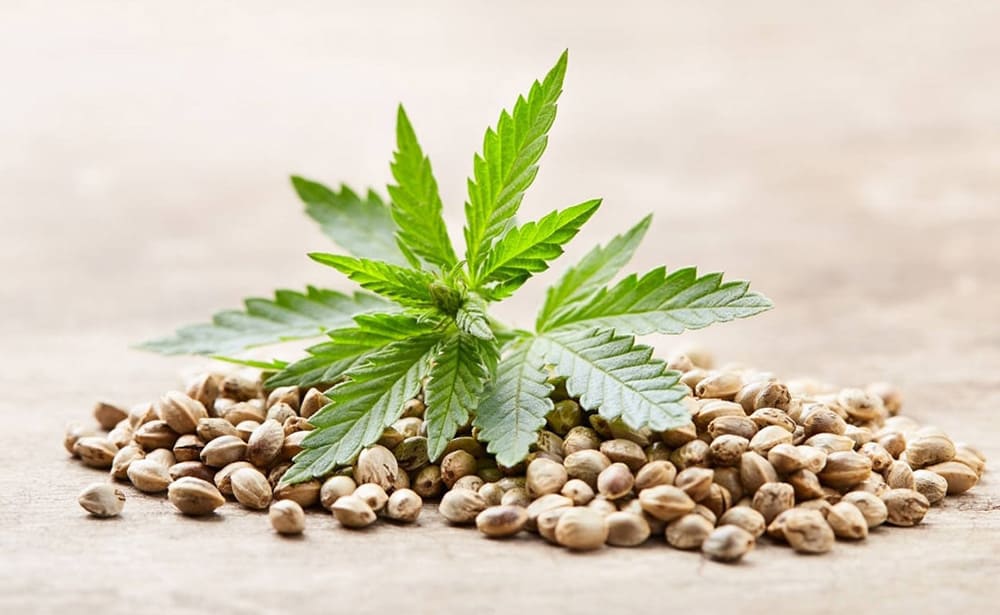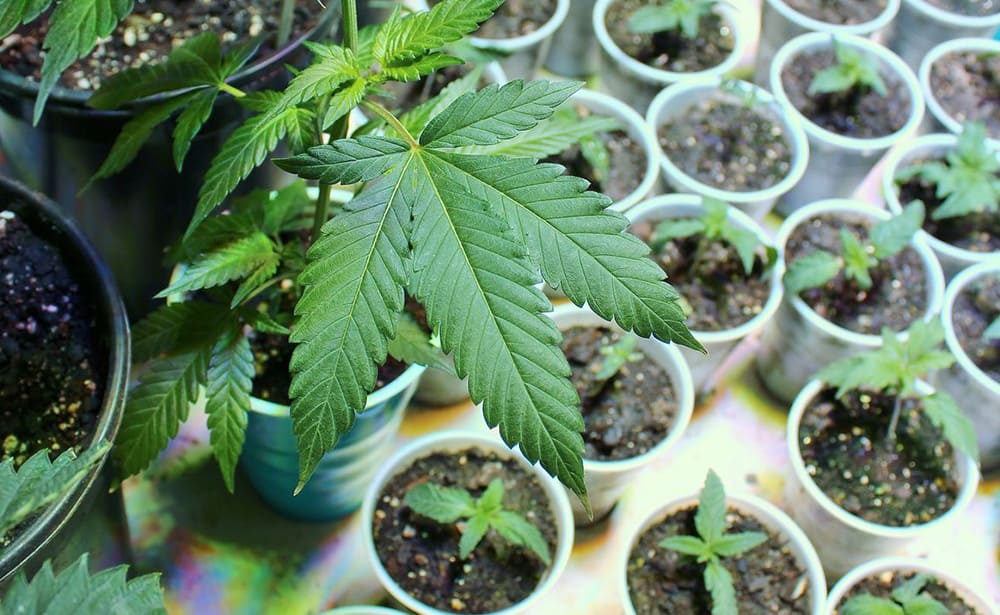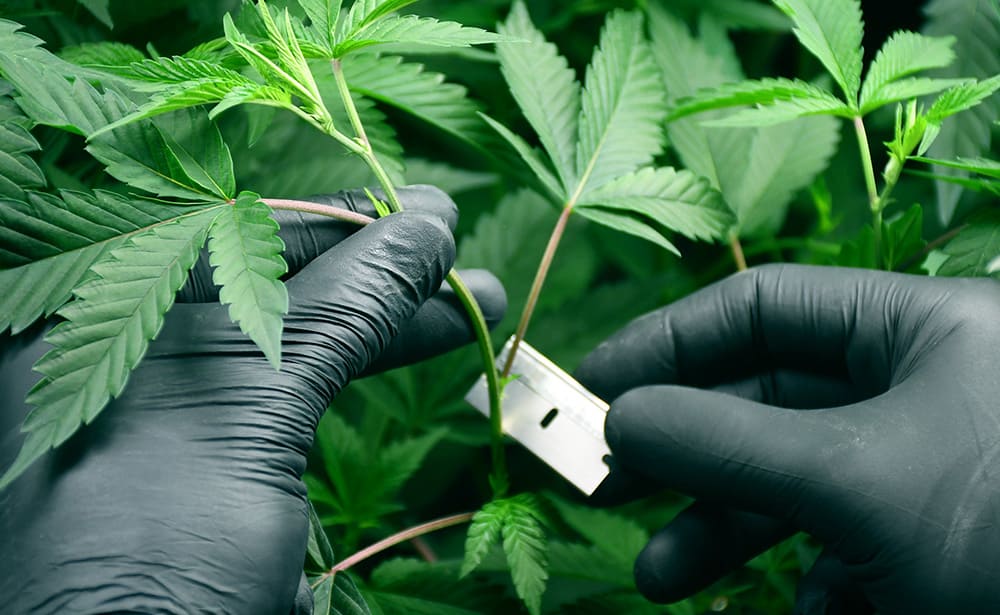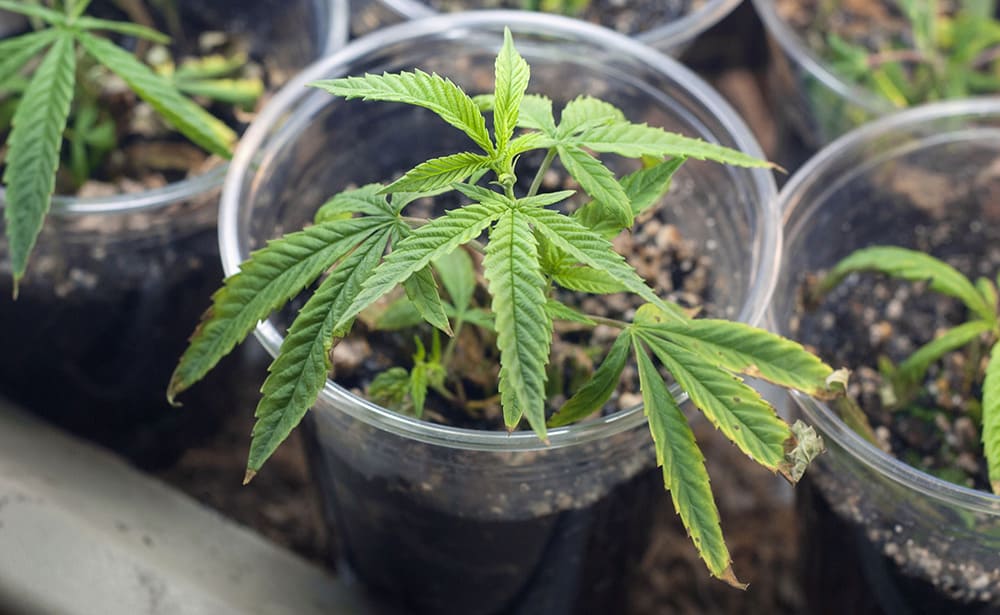What is weed clones?

In the fascinating world of weed cultivation, the journey of a plant can begin from either a seed or a clones, each method offering its unique set of benefits.
When starting from seeds, the process entails germination, and in the case of regular seeds, the need to determine the plant’s sex, separating females from males. However, the route of growing from clones streamlines these initial steps.
Clone , the offspring of exact cuttings taken from another plant, fondly known as the “mother,” ensure a perfect genetic match. To kickstart their growth, clones need to develop roots before finding their home in soil or another suitable grow medium.
Nurture comes in the form of root cubes or a cloner, often accompanied by rooting hormones, providing the much-needed impetus for root development. Once rooted, the clone enters the seedling stage, ready to flourish.
A significant advantage of the cloning process lies in preserving the genetic consistency of a specific strain. This method ensures that from one generation to the next, growers can consistently produce the same top-notch product, delighting consumers with a reliable and predictable experience.
For those who are interested in growing weed, we recommend reading these articles:
What Are weed Clones and Seeds?

In the captivating world of cannabis cultivation, two paths beckon: cannabis seeds and weed clones. Cannabis seeds, ovular and peppercorn-sized, carry the potential of entire plants with unique genetic variations. When planted, they flourish into vibrant marijuana plants.
On the other hand, weed clones are exact cuttings from a live plant, sharing its genetic heritage. Nurtured with care, clones mature into genetically identical marijuana plants.
The mystique of cannabis seeds lies in their tiny form, concealing vast potential within. Female cannabis plants produce seeds with unique genetic traits. When planted and nurtured, they grow into vibrant marijuana plants, each boasting its distinct characteristics.
In contrast, cannabis clones offer an intimate connection to their “mother” plant. As exact cuttings, they replicate the mother plant’s genetic legacy. With tender care, clones develop into mature marijuana plants, mirroring the traits of their cherished origin.
As growers face this crossroads, they contemplate the enigmatic potential of cannabis seeds, with each tiny vessel carrying its unique genetic wonders, or the allure of cannabis clones, offering a direct link to the genetic legacy of their mother plant.
Speaking of uniqueness, it is impossible not to mention Mint Chip strain in Sauce Cart from our catalog. A curious hybrid created from a SinMint Cookies x Green Ribbon BX pairing. The effects are what make this strain curious: it manages to create substantial mental uplift, while leaving you grounded and functional.
Or you can turn to the classics and plunge into the world of exciting effects together with OG Kush Sauce Cart. It’s a tantalizing strain, exudes a captivating aroma of lemon-pine-fuel that teases the senses. Its enigmatic high-THC content delivers a delightful blend of head and body effects, creating a mesmerizing dance of relaxation and euphoria.
Whichever path chosen, the journey of cannabis cultivation unveils a realm of beauty and diversity, where each nurtured plant becomes a testament to the art and science of marijuana growth.
Cannabis Cloning: Pros and Cons

Growing weed from clones provides a plethora of advantages, enticing seasoned cultivators with its efficiency and reliability. These pros include:
- Assured Female Plants: When you clone from a known female mother plant, each new cutting is guaranteed to be female, yielding cannabinoid- and terpene-rich cannabis flowers.
- Cost-Effectiveness: Cloning offers significant savings compared to purchasing seeds, especially when dealing with feminized seeds, as non-feminized seeds can produce unproductive male plants, wasting time and resources.
- Faster Time to Harvest: By bypassing germination and seedling stages, clones accelerate the cultivation process, potentially shortening the time to harvest by up to a month.
- Consistent Quality: Clones preserve the exact genetic makeup of the mother plant, ensuring a uniform and dependable quality and potency in each new clone.
Despite these enticing benefits, cannabis cloning is not without its downsides:
- Clone Sensitivity: Freshly cut clones lack a developed root system, rendering them highly sensitive to environmental stressors. This technique is best left to experienced growers who can provide the ideal conditions for successful rooting.
- Lower Yield Potential: Clones often develop less robust root systems compared to plants grown from seeds, resulting in smaller overall plants and reduced harvest yields.
Mastering cannabis cloning empowers cultivators with numerous advantages, revolutionizing their practices. They can now reap bountiful, consistent harvests of premium cannabis.
How to Take Clones from a Mother Plant

Creating cannabis clone cuttings is a straightforward process that requires essential tools:
- A healthy mother plant with strong vegetative limbs, ideally measuring 4 to 20 inches (10.16 to 50.8 cm).
- A sharp cutting tool for clean cuts.
- A cup of water to keep the freshly cut clones vibrant.
- Rooting medium, like rockwool cubes or soil, for root development.
- Optional rooting hormones for better success and accelerated growth.
- Adequate lighting to maintain the mother plant’s health and promote clone growth.
- A cloning dome or plastic bag for a high-humidity environment.
Select a healthy female mother plant, at least a month old, kept under an 18/6 light cycle in a separate space. Choose branches with four or more nodes, and cut them between 4 to 16 inches (10.16 to 40.64 cm) long.
Make precise 45-degree angle cuts and remove excess growth below the top two nodes. Place the cuttings in water immediately to prevent wilting. Rooting gels or solutions can enhance success and provide beneficial nutrients.
Gently insert the cuttings into the rooting medium, ensuring no light hits the roots. Maintain high humidity (around 75-90%) within the cloning dome during the rooting phase.
Within 7 to 14 days, roots should form, indicating the clones are ready for transplantation and growth into mature cannabis plants. Cloning allows cultivators to ensure genetic consistency and cultivate desired strains with confidence. Mastering this technique opens a world of possibilities for cannabis growers.
In case you just want to smoke and not bother, then take a look at Sauce Carts section of our catalog. From bright to classic flavors and from strong to mild effects, in this section you will definitely find something for yourself.
How to Store Clones Long Term

Preserving weed clones for future use is a simple process to safeguard your precious genetics. Follow these steps to store clones in the refrigerator for 2-3 months:
- Prepare the Clone: Moist a paper towel and gently wrap it around a healthy, well-rooted clone.
- Seal in a Resealable Bag: Place the wrapped clone in a resealable plastic bag, leaving some air inside before sealing it tightly.
- Refrigerate with Care: Store the bag in the refrigerator, avoiding extremely cold temperatures below 40°F (4.4°C) to prevent damage to the plant cell walls.
- Weekly Air Replacement: Open the bag once a week to replace the air, ensuring proper airflow and freshness.
When using the stored clones:
- Warm Up: Take the clones out of the fridge and let the stems sit in water for about 30 minutes to adjust to room temperature.
- Encourage Rooting: If the clones have been in the fridge for an extended period and are slow to root, trim half an inch (1.27 cm) from the stem’s end and use rooting gel for an extra boost.
Confidently preserve cannabis clones in the refrigerator with these simple instructions. Keep them healthy and viable for future cultivation endeavors. With this backup plan in place, you’ll always have peace of mind in case unexpected challenges arise with your primary clones.
In cannabis cultivation, choosing between seeds and clones offers diverse possibilities. Seeds hold unique genetic variations, while clones mirror their “mother” plant’s legacy. Mastering cloning techniques allows growers to preserve genetics and nurture premium cannabis, shaping the future of cultivation endeavors.















